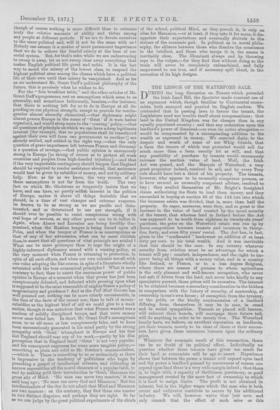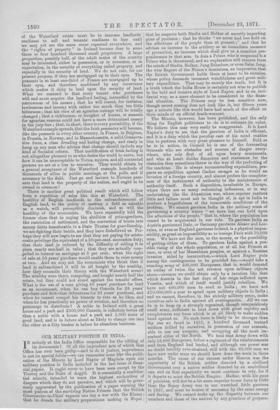THE LESSON OF THE WATERFORD SALE.
DURING the long discussion on Tenure which preceded the Irish Land Bill, the Spectator made constant use of an argument which, though familiar to Continental econo- mists, both annoyed and puzzled its English readers. We contended that in passing laws to favour the tenant, the Legislature need not trouble itself about compensations ; that land in the United Kingdom was far cheaper than in any equally populated country ; and that any restriction upon the landlord's power of dismissal—or even its entire abrogation— would be compensated by a corresponding addition to his wealth as expressed in money. We asserted flatly, to the despair and wrath of some of our Whig friends, that a farm the tenure of which was protected would sell for much more than a farm usually let at will, and that any possibility of purchase by tenants would enormously increase the auction value of land. Well, the Irish Act was passed, and the Marquis of Waterford, a very great proprietor indeed, resolved to sell, and by every Tory rule should have lost a third of his property. The tenants, however, who appear to be unusually competent persons, or to have secured an unusually competent adviser, resolved to buy ; they availed themselves of Mr. Bright's farsighted clause authorizing the State to lend them money, and they succeeded in buying at auction 86 of the 148 lots into which the immense estate was divided, that is, more than half the property. So eager, moreover, were they, and so great is the increase in the value of land created by the novel security of the tenant, that whereas land in Ireland before the Act was supposed to be worth from eighteen to twenty-six years' purchase, the price on the Waterford estate was run up by fierce competition between tenants and investors to thirty- five, forty, and even fifty years' rental. The Act has, in fact, given to the "confiscated " landowner an addition of at least sixty per cent. to his total wealth. And it was inevitable that this should be the case. In any country whatever security from eviction must be an advantage for which a tenant will pay ; comfort, independence, and the right to im- prove being all things with a money value, and in a country like Ireland, or France, or in a less degree Belgium, where there are masses of persons to whom agriculture is the only pleasant and well-known occupation, who never feel safe if driven from the land, and never take kindly to any speculative pursuit, those prices will be excessive. The interest to be obtained becomes a secondary consideration to the bidders in comparison with the luxury of security, of mastership, of ownership in one's own house ; of exemption from the tyranny, or the pride, or the kindly condescension of a landlord differing from themselves it may be in race, in creed and in social sympathies. Tenants so placed will borrow, will exhaust their hoards, will mortgage their future toil, will do anything in order to be merely free. The Waterford family have, we believe, an excellent reputation as landlords, yet their tenants, merely to be clear of them or their succes- sors, have given these enormous bonuses upon the ordinary price. Whatever the economic result of this transaction, there can be no doubt of its political effect. Individually we question whether these tenants have given too much for their land, as economists will be apt to assert. Experience shows that between the power a tenant will expend upon land and the power a landlord pressed by narrowness of means can expend upon land there is a very wide margin indeed ; that there is, to begin with, a capacity of thriftiness, parsimony, or good management created by the mere fact of ownership to which it is hard to assign limits. The profit is not obtained in interest, but in the higher wages which the man who is both owner and cultivator contrives to secure by his additional industry. We will, however, waive that just now, and only remark that the effect of such sales as this of the Waterford estate must be to increase landlords' readiness to sell and tenants' readiness to buy until we may yet see the same scene repeated everywhere, and the " rights of property " in Ireland become dear to some three or four hundred thousand small proprietors. A large proportion, possibly half, of the adult males of the country may be interested, either in possession, or in reversion, or in expectation, in the security of everything called property, and especially in the security of land. We do not care, for our present purpose, if they are mortgaged up to their eyes. The peasants in at least one-third of France are mortgaged up to their eyes, and therefore maddened by any occurrence which makes it risky to lend upon the security of land. What we contend is that every tenant who purchases will and must acquire the landlord feeling, intensified by the narrowness of his means ; that he will resent, for instance, lawlessness and larceny with rather too much than too little bitterness ; that his view of an agrarian outrage will be totally changed ; that a rickburner, or hougher of horses, or assassin for agrarian reasons could not have a more determined enemy in the jury-box ; that, in short, there is every probability, if the Waterford example spreads, that the Irish peasantry will become, like the peasants in every other country, in France, in Belgium, in Prussia, in Norway, and in Massachussetts, a solid Conserva- tive force, a class dreading and hating change, and ready to hang up any man who advises that change should include any kind of Socialist reform. That modification of Irish feeling is not altogether pleasant to us who desire the world to move, but show it can be unacceptable to Tories, squires, and all contented .persons we are at a loss to conceive. They would obtain by .a general acceptance of the Waterford example hundreds of thousands of allies in public meetings, at the polls, and if necessary in the field. Just go and lecture to Norman peas- ants that land is the property of the nation, and ought to be owned in common I
There is another great political result which will follow from a repetition of salesi like this at Waterford. The hostility of English landlords to the enfranchisement of English land, to the policy of making a field as saleable as a watch, will perceptibly diminish, and so will the hostility of the economists. We have repeatedly told the former class that in urging the abolition of primogeniture, the restriction of settlement, and the conversion of trusts into money debts transferable to a State Trustee for guardianship, we are fighting their battle, and they have disbelieved us. Per- haps they will now begin to see that they are paying for aristo- cratic privilege the equivalent of a 50-per-cent. succession duty; that their land is reduced by the difficulty of selling it in plots nearly one-half in value ; that they are actually com- pelled to borrow on mortgage at 5 per cont., when the right of sale at 50 years' purchase would enable them to raise money at two. And we may ask the economists who think that if land is enfranchised it will be all bought by the wealthy, how they reconcile their theory with the Waterford scene?
The wealthy were there, competing, and bought nearly half the ,estate, but they could not stand against the tenants' offers. What is the use of a man giving 50 years' purchase for land as an investment, when he can buy Consols for 28 years' purchase and first-class debentures for 23 years' purchase, and when ho cannot compel his tenants to vote as ho likes, and when he has practically no power of eviction, and therefore no patronage to distribute ? A noble in Ireland with a great house and a park and £300,000 Consols, is infinitely better off than a noble with a house and a park and 5,000 acres of good land, and is in future about as likely to change one into the other as a City banker is before he abandons business.











































 Previous page
Previous page